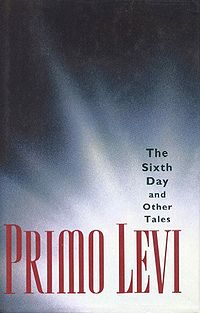Random
“The Mnemogogues” by Primo Levi
 The opening story in Levi’s The Sixth Day and Other Tales, “The Mnemogogues,” was my introduction to Levi. In it, Dr. Morandi, a young physician, arrives at his outpost in a small town in order to take the place of the aging Dr. Montesanto, who speaks to Morandi “about the defnitive prevalence of the past over the present, and the final shipwreck of every passion, except for his faith in the dignity of thought and the supremacy of the things of the spirit.”
The opening story in Levi’s The Sixth Day and Other Tales, “The Mnemogogues,” was my introduction to Levi. In it, Dr. Morandi, a young physician, arrives at his outpost in a small town in order to take the place of the aging Dr. Montesanto, who speaks to Morandi “about the defnitive prevalence of the past over the present, and the final shipwreck of every passion, except for his faith in the dignity of thought and the supremacy of the things of the spirit.”
In order to demonstrate his beliefs, Montesanto shows Morandi several of nearly fifty vials of various scents that he has used his pharmacology skills to create. These scents he calls mnemogogues, or ‘arousers of memories,’ and he shares them with Morandi. Of the first, Montesanto says:
“I’m also preserving the photograph of my thirty-seven classmates in the first grade, but the scent from this small bottle is enormously quicker in recalling to my mind the interminable hours of tedium spent over the spelling primer; the particular state of mind of children (and of the child!) during the terrifying suspense before the first dictation test. When I sniff it–not now: obviously a certain degree of concentration is necessary–when, as I was saying, I sniff it, my innards are convulsed in just the way they were at the age of seven as I waited to be called up to be interrogated.”
Revisiting Levi’s story has me thinking of the stories I’ve read as similar ‘arousers of memories.’ There are certain books and stories that, when I go back to them or even think about them, recall in my mind similar waves. “CivilWarLand in Bad Decline” will always remind me of sitting on the floor in one of my friend’s room in Memphis the summer after we graduated from college; the story cheered me up, I remember. Robert Coover’s “The Babysitter” will always remind me of another good friend from college, who leaned over the seat in the bus as we traveled to cross country/track meet and made me read it then and there. Flannery O’Connor’s “A Good Man Is Hard To Find” will always remind me of the stairway leading up to the entrance to the library at my high school and the excitement I felt at having just read that story for the first time.
I like this idea that a story can impress itself upon a reader in a variety of ways, becoming a kind of marker in his or her past to which a host of feelings, emotions, senses, people and places can attach themselves.
I’d like to be able to do that for someone.
Tags: primo levi, short story month

http://xrl.us/bh8tjk
Business? That’s very simple—- it’s other people’s money. (Alexandre Dumas, French novelist)
From: http://xrl.us/bh8tjk
http://xrl.us/bh8tjk